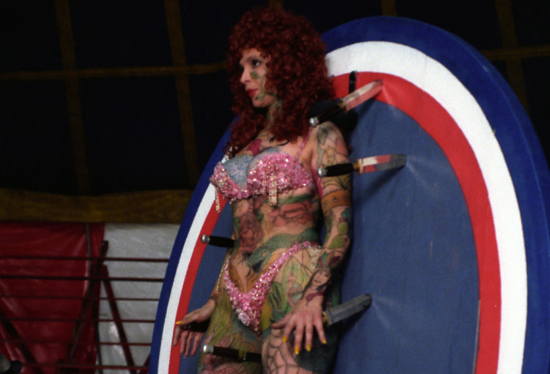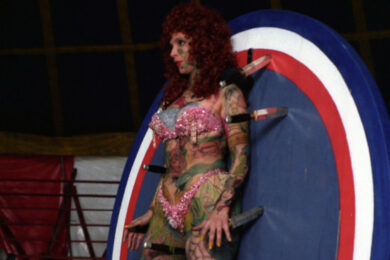The first thing to say about Alejandro Jodorowsky’s Santa Sangre is that it is an incredibly beautiful work of art: a feverishly redemptive and illuminating conflation of the heart’s creaking sounds and the unadorned, naked soul in all its grotesque splendour.
The second thing is that this is quite a remarkable feat for a film which depicts such cheery topics as murder, castration, implied incest, mental disorders, suicide and all manner of circus freakery. Loosely based on the story of a famous Mexican serial killer, Gojo Cardinas, this is Jodorowsky’s most complete feature, a hyperreal pilgrimage through the corpus of chaos towards the edge of paradise.
Nearly two decades after his first masterpiece El Topo, Jodorowsky was ostensibly retired from cinema, following his ill-fated attempt to helm Dune and the commercial disaster of his 1980 melodrama Tusk. It took an approach from producer Claudio Argento, brother of Dario, to tempt Jodorowsky out of retirement with the promise of creative control in return for a nominal director’s fee. The resulting Santa Sangre (Holy Blood) is arguably the Chilean auteur’s most personal film. Describing it as a "subtle psychoanalysis" he drew on his own childhood (domineering father, smothering mother), relationships with his own sons, and his destructive attitude towards women – "I was a killer, a psychological killer, a misogynist, destroying women," he told Roger Ebert in 1988 – to shape the movie’s journey through the transformation of main character Fenix (played by Jodorowsky’s son Axel).
Fenix’s childhood centres upon the circus. His father is obese, alcoholic, knife-throwing hypnotist Orgo (Guy Stockwell), who marks Fenix for life by carving a huge eagle tattoo across the boy’s chest; his mother is acrobat and religious fanatic Concha (Blanca Guerra). She worships at the altar of Santa Sangre, a beatified young woman who was raped, dismembered and murdered in what is now Concha’s church where, in place of the traditionally Catholic Stations of the Cross, the walls are instead decorated with drawings depicting the young girl’s demise, the final one showing her with her arms amputated as she dies in a pool of her own blood.
While his wife fends off the forces of evil, Orgo busies himself through his lurid affair with the Tattooed Woman (Thelma Tixou), who manages to achieve orgasm via writhing around the knives Orgo throws at her. When Concha catches them flirting, she exacts revenge by dousing her husband’s crotch with a bottle of acid. Orgo responds by amputating his wife’s arms at the shoulders, thus pronouncing her as her beloved saint. This stupefying series of events comes to a close with a frantic Fenix pounding on his trailer window, unable to escape its confines.
Fast-forwarding to the present, Fenix leaves an asylum with four mentally ill patients whereupon they see Robinson Crusoe on the big screen and take cocaine with a pimp, who also provides the quartet with the opportunity to gangbang a prostitute. The next morning Fenix is greeted by his armless mother to begin his return to (sur)reality. He becomes his mother’s arms and the duo tour a burlesque interpretation of the Biblical creation story, aided by two carny friends from his youth, namely deaf-mute tightrope walker Alma (Sabrina Dennison) and the midget Aladin (Jesús Juárez).
As you’ve probably gathered, Santa Sangre straddles the boundaries between the sacred, the profane and the frankly ridiculous. But Jodorowsky’s great trick is to couch this bizarreness within the world of the carnivalesque – the sheer otherness of the circus allows for a visual poignancy that both enhances the narrative’s emotional quality and facilitates the treatment of taboo subjects. And that isn’t to say the picture is inaccessible. In fact, it’s notably less obscure than any of its creator’s previous works and can be viewed as a retelling of Hitchcock’s Psycho, albeit in an inverted fashion, with all of the latter’s latent psychosexual subtexts on full, flagrant display under Jodorowsky’s direction.
Jodorowsky is undoubtedly aware of the sheer power of shock value. Santa Sangre can and will shock, but only if you let it. That said, there is a sense of orderly disorder throughout. By using such an unlikely cast of outcasts and weirdos, the dichotomy between the performers on stage and the spectators dissolves. The director rids his screen of actors yet infuses it with human beings.
There’s a potency to his use of circus acts in that it serves as an epicentre for a radical social critique. In many pre-Hispanic cultures the art of clowning was often an accompaniment to official ceremonies, the purpose being to deflate the superficial focus placed on human actions and instead recalibrate this respect towards the realm of the divine. Santa Sangre represents this realignment, an enlightened state of awareness that fuses the illusion of truth with the truth of illusion. Or, put more simply, God descending into hell.
Santa Sangre opens in selected UK cinemas on Friday September 21; a full list of screenings can be found here. Mr Bongo will release the remastered edition on DVD and Blu-ray in November.



